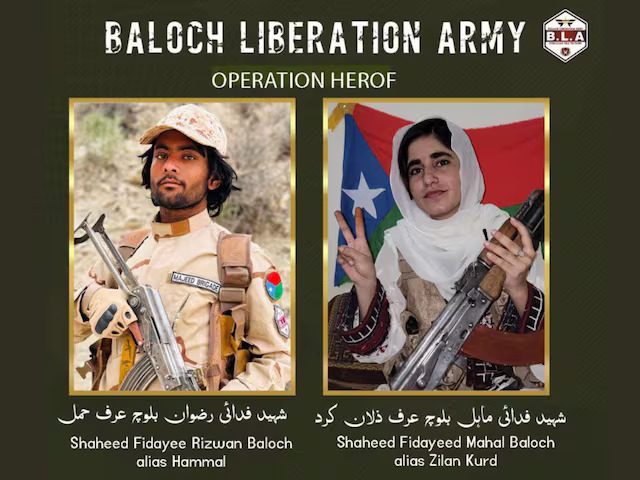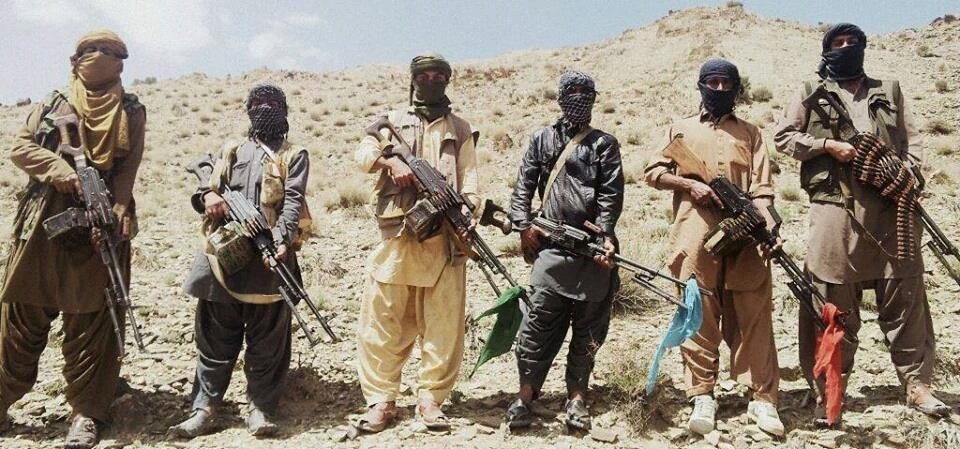
On 25 August 2024, Baloch Liberation Army (BLA) commenced its “Fidayeen Operation Herof” (Dark Windy Storm) in the restive state of Balochistan. The attack is considered to be one of the most devastating attacks compared to the ones orchestrated by the Baloch outfit. According to a statement released by BLA, the operation was conducted a day prior to the 18th death Anniversary of Shaheed Nawab Akbar Bugti of Balochistan. The number of casualties of Pakistani military personnel due to the operation is estimated to be over 100.
Operation Herof
The operation began on 25 August 2024. A female fidayeen, named Mahal Baloch, also known as Zilan Kurd, along with Fidayee Rizwan Baloch detonated their Vehicle-Borne Improvised Explosive Device (VBIED) at the gate of Pakistan’s Bela military camp, while several checkpoints and blockades were erected on major highways across the area.
After the VBIED detonation, the elite arm of BLA, the Majeed Brigade, led by Commander Ghous Bakhsh Simalani, known as Talib, infiltrated the army camp and managed to take control of a large portion of the camp, killing more than 40 military personnel. According to the BLA, Pakistan military reinforcements were forced to retreat and were unable to buttress the efforts to counter the attack on the camp.
Simalani is reported to have joined BLA in 2019 and was the son of Meshedar Simalani, who was killed in November 2022 during a BLA attack on the Pakistani forces.
According to Jeeyand Baloch, the spokesperson of BLA, the “Fidayeen unit” of the BLA – the Majeed Brigade – had succeeded in holding down the Bela camp for 20 hours, during which 68 military personnel were killed, leaving several injured.
While the operation commenced within the Bela camp, major highways in Balochistan were blockaded by the BLA’s Fatah Squad Special Tactical Operations Squad (STOS). Checkpoints and surveillance was conducted by the outfit to restrict the movement of the military and law enforcement personnel. During the blockades, 62 military personnel were reported to have been killed in the clash with the BLA unit. Further reports of BLA taking over 22 military, police, and Levies personnel as hostages surfaced.
During the course of the operation, several highways such as the Gwadar-Jiwani Coastal Highway, Mand-Turbat Highway in the Hotabad area, Abdoi Highway in Tegran, Turbat-Heronk CPEC Highway, Quetta-Taftan Highway, Noshki-Kharan Highway, Mastung-Khadkucha Highway, Kalat- Karachi Highway, Bolan and Koh-e-Sulaiman’s main highways, Balgtar-Panjgur and Sibi-Mithri Highway were reported to have been cordoned off by the outfit.
Reports of a military convoy being attacked on the Mand-Turbat road in the Hotabad area, resulting the deaths of five Pakistani soldiers also made the news.

Attacks also carried out at toll plazas such as the Garari in Kalat, which was captured by the BLA, and resulted in the deaths of at least 15 soldiers. In Bolan, 16 Frontier Corps personnel were attacked and their weapons confiscated.
In the process of seizing maximum ground and obstructing military reinforcement to the affected region, the railway tracks running through Bolan were also destroyed by the BLA.
On 26 August, Operation Herof concluded with BLA reiterating its objective to drive Chinese presence out of Balochistan. It might be noted, this was not the first time when the BLA had issued a warning to China.
Additionally, China’s military delegation led by General Li Qiaoming, visited Pakistan on the death anniversary of Akbar Bugti. Several meetings were held between the Chinese delegation and Pakistan prime minister Shehbaz Sharif, defence minister Khawaja Asif, and chief of army staff Gen Asim Munir. At the time of the meetings, BLA had already struck a terror chord in Balochistan and was looking towards the completion of its operation.
Post operation Herof, the Balich media handle on behalf of their leader Aslam Baloch released the names of its martyrs and praised their efforts.
Amongst the dead fighters he mentioned Muhammad Baloch, known as Mirak, from Panjgur, Sangat Fazal Gul Zehri, known as Shavez, Sangat Tayab, known as Lala, from Noshki, Sangat Junaid Zehri, known as Kami, from Khuzdar,Muhammad Asif Nechari, known as Naveed, and Muhammad Bakhsh Simalani, known as Khalid.
Muhammad Baloch joined BLA in 2022 was also related to Sangat Raees, who died in the 2018 Karachi consulate attack. It is worth mentioning that Sangat Tayab, was a soldier in Pakistan military prior to joining BLA. After getting discharged from the Pakistani military, he offered his services to BLA for the Baloch cause.
The Aftermath
The 25-26 August BLA attacks were condemned as acts of terrorism by Pakistan and sanitation operations were ordered in Balochistan. The US, too, backed Pakistan and condemned the attacks as an act of terror. Pakistan did not release the names of the military officers killed in Operation Herof. However, its Inter-Services Public Relations (ISPR) released a statement in regards to the attacks, stating “On behest of inimical and hostile forces, these cowardly acts of terrorism were aimed at disrupting the peaceful environment and development of Balochistan by targeting mainly the innocent civilians, especially in Musakhail, Kalat and Labela Districts. Resultantly, numerous innocent civilians embraced shahadat.”
Furthermore, the ISPR also stated that the BLA militants had indiscriminately targeted civilians by halting a bus in Rara Sham area in Musakhail district.
The BLA responded by claiming that the statements made by the ISPR were designed to control perception and instil doubt among the Baloch masses, who viewed the group as freedom fighters. It further clarified that the individuals targeted on the bus were indeed Pakistan’s military personnel, part of the death squad who were disguised as civilians. To clarify its motive, the BLA issued a warning to all the inhabitants of the region asking them to avoid the areas which it had planned to target prior the commencement of its operation. Its objective remained confined to targeting the military and the law enforcement agencies.
Pakistan’s consistent disregard for the Baloch grievances, extra judicial killings of the ethnic Baloch, arbitrary detainment, abductions and forced displacement of the Baloch to alter the demography in the region and to accommodate the Chinese immigrants has left feelings of despondency and resentment amongst the Baloch.
To exacerbate the already brewing hatred towards the Pakistan military, several Pashtuns, Sindhis and minority groups along with the Balochis hold Islamabad responsible for the atrocities afflicted and view Pakistan as an illegal occupier of their lands, exploiting their resources to benefit Punjab and the Chinese.
The presence of the Chinese due to China-Pakistan Economic Corridor (CPEC) has been a cardinal factor for the rapid uptick in the level of insurgencies and attacks on the Chinese nationals residing in Pakistan. This has become a root cause for China to demand a large-scale military operation such as Operation Zarb-e-Azb to contain the insurgent situation and protect its people. In order to smoothen the situation with a miffed China, Shehbaaz Sharif visited China and pledged to take necessary action to maintain strong ties with the “iron brother.”
In June 2024, Pakistan complied with China’s wishes and commenced Operation Azm-e-Istehkam. The announcement of the operation was met with several protests in the Khyber Pakhtunkhwa (KP) area. The operation is expected to expedite the implementation of the Pakistan’s National Action Plan (NAP) which was conceived in 2014. The news of the operation was not well received by the locals of Khyber Pakhtunkhwa and protests have prevailed ever since against the proposed operation.
It may be important to mention that the reservations from the citizens seem valid, given that Operation Ground Zero comes as a stark reminder of Pakistan’s propitiation policy towards the Chinese while cloistering off the Baloch. In 2021, Pakistani Major General Ayman Bilal confirmed that on orders of China, he led the operation to crush the Baloch freedom movement. The success of the CPEC was more essential to Pakistan’s interest and so was placating China.
Due to all the past factors, undoubtedly, the insurgent groups, such as the BLA, have consistently found fuel to spark their ongoing conflagration against Pakistan. Several offshoots or splinter groups along with Baloch insurgent groups, which are anti-Pakistan, such as Hafiz Gulbahadur group, Tehreek-e-Taliban Pakistan or Sindhudesh Revolutionary Army, are seen to coordinate with one another to sometimes carry joint operations as well.
Pakistan’s unstable diplomatic relations with the Taliban may also add to Pakistan’s deteriorating security situation. It may be vital for Pakistan’s current regime to address the grievances of its citizens besides cleaning its political outhouse of rivals rather than simply doing somersaults on the Chinese whims.

















